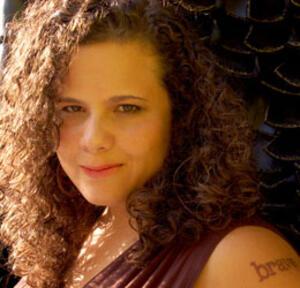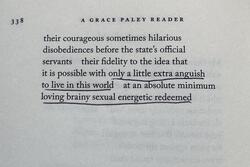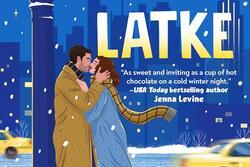Meet Jaclyn Friedman: Jewess with attitude
I recently had the pleasure to sit down for brunch with Jaclyn Friedman, Executive Director of Women, Action and the Media and co-editor of Yes Means Yes: Visions of Female Sexual Power and a World Without Rape. Jaclyn Friedman is writer, speaker, activist, and rising star in the current feminist community. She’s also a “Jewess with attitude.” Over grilled bananas and breakfast tapas, I learned just how much Jaclyn’s Jewish background factors into her activism.
Leah Berkenwald (LB): What was your path to feminism?
Jaclyn Friedman (JF): My first feminist role model was Sally Preisand, who as fate would have it was the rabbi at my congregation in New Jersey. Growing up, we also had a female cantor, and there’s a story told over and over in which, one evening after services, a boy asked, “Can boys be rabbis too?” Which tells you everything you need to know about the power of role models. The thing about Sally is that I kind of knew she was the first woman rabbi, but I didn't really understand that she was a rock star - she was just my rabbi. It was very subtle; I wouldn't have told you then that I was learning about feminism, but I was.
I got really involved with JFTY (the New Jersey Reform youth group now known as NFTY-GER) where we incorporated the social justice framework I had begun learning from Sally’s leadership into nearly everything we did. So my social justice framework comes from Judaism. Judaism is also often my touchstone; if I feel like the work is getting overwhelming, or I don't feel like I'm getting anywhere, or I want to give up I remember: “It is not yours to complete the work, neither is it yours to desist from it.” That’s from the Pirkei Avot. We would sing the Hebrew version, Lo Alecha, at camp all the time, and it's never left me.
I’ve always identified as Jewish; I celebrate the major holidays and get a lot out of the rituals. I haven't belonged to a congregation in a long time, but I feel like in the last couple of years, Judaism is starting to pull me back. Last month I attended Joyce Antler’s conference on Women's Liberation and Jewish Identity and it was really useful for me to locate myself in that tradition. The history of Jewish women in feminism is largely invisible, which is why that conference was so meaningful. I suddenly understood, “Oh, I make sense in this context. This is not accidental.”
LB: How did you get involved in issues regarding sexuality, rape and violence prevention?
JF: That was a lot of what was happening on campus in terms of feminism. I got involved in those issues very early on, and as my undergraduate experience went on they became personal. My junior year I was sexually assaulted. I pressed charges through the on-campus judicial system. Afterward, I started hearing stories from other women about how badly the judicial board had handled their cases. My first response was to go to the Dean of Students – I was in Student Government for most of my time at Wesleyan, so my first inclination was to work within the system. But she stonewalled me, so in my senior year I formed a renegade student committee to investigate the way sexual assault cases were handled on campus.
Our year-long study ended up winning the Psychology department award for best research. We discovered that nobody knew what anyone’s rights and responsibilities were, whether you were the accused or the accuser, so we tried to clarify what was supposed to be happening and make the system more fair and accountable for everyone. The report caused quite a stir, and the school actually implemented a fair number of our recommendations over the next few years. I have to say that’s one of the accomplishments I’m most proud of in my life. Creating institutional change around this stuff is not easy.
LB: So how did you go from writing about rape to writing about pleasure?
JF: Sexual violence is obviously something we should be against because it’s a horrible injustice, but some of my reasons for being anti-violence are also about being pro-pleasure. People of all genders are robbed of the potential pleasure of our sexuality by sexual violence, and that pleasure is such an untapped positive force in the world. I’ve long thought that one of the reasons Yes Means Yes did so well was because it wasn't just about ending sexual violence -- it was also about imagining the world we actually do want to live in, something we can work towards. Not coincidentally, it would be a world where everyone has better sex except the rapists.
I’m often grateful that Judaism is so clear about this, or at least it was for me. What I took from my Jewish upbringing about sex is “We’ve suffered enough. If it feels good for everyone involved, please, enjoy!” There was no sex shame - it’s a double mitzvah on Shabbat. I know that's not everybody’s Judaism, but that's mine.
LB: So tell me about your new book.
JF: The new book is called What You Really Really Want: the Smart Girl’s Shame-Free Guide to Sex and Safety. It’s a workbook to help women figure out what they authentically want from their own sexuality, teasing out all the messages we get from our families and religion and the media and government and our peers and finding the “you” in there and figuring out how to practice that in the real world.
Part of it involves debunking myths about safety and fear, and figuring out how to make decisions about how to manage risk. Making everything about minimizing risk is really not helpful. The idea that women who take risks with their sexuality are stupid or uninformed or need to be protected from themselves is a very infantilizing model. Instead we should be helping women figure out what risks make sense for them. There’s no way to eliminate risk from your sexual life, or from your life in general. It’s about getting educated about what the risks really are (and aren’t), and figuring out which risks are right for you.
LB: Do you talk about hookup culture?
JF: There’s a chapter called “What’s Love Got To Do With It” that gets into many different ways people do sexual relationships and the pros and cons for all for them. There’s nothing wrong with hooking up. When people are worried about ”the hookup culture” they’re generally worried about two things that are important things to talk about: alcohol and sex, and girls feeling like they don’t have power in relationships with boys. Those are important conversations to have but they get all mixed up with slut-shaming when we just talk about girls and “hooking up.”
The research shows that as long as both partners want a hookup, and neither of them secretly wants a relationship, it’s not damaging to either of them, regardless of gender. But if you’re a girl and you like boys and you think the only way you can get attention from them is to have sex on their terms, that’s a problem. What feels terrible is that you’re giving up your agency, not that you’re having sex outside of a committed relationship. Similarly with alcohol, if you’re getting drunk in order to override what you want because you think you need to be able to do x, y, and z to achieve certain social ends, that feels crappy. What you’re telling yourself over and over is that your own boundaries don’t matter. It’s not the hookup that’s doing emotional damage; it’s you overriding your own boundaries that’s damaging. We need to break that conversation down, and that’s something this book does.
LB: What was the process of writing this book?
JF: I put out a call for volunteers, and from the hundreds of responses I got, I selected 11 women from around the country with different backgrounds and perspectives to workshop the book. As I drafted each chapter, they would read it and do the exercises and give me feedback on what worked and didn’t, as well as on their experience of working with the book. Their stories are woven through every chapter, and their voices are so, so powerful. I really hope that lots of women will work through the book in groups, because the conversation it fostered was amazing, but even if you don’t have a group, their stories will be there with you.
The process of working with these women was so inspiring for me, beyond what I’d even hoped. I created entire chapters for them that I hadn’t planned on writing. Chapter 6, my favorite, is called “Freaks and Geeks.” It came up because women were asking, “How do I know people want me for me, not for my Black booty or because I’m transgender or because they have a fat fetish,” or whatever the things are about you that make you feel freaky. A big fear is not knowing if someone wants “you” or this fetishy thing that you symbolize, like with those creepy, non-Jewish guys on JDate, right? So the book gives some ways to think about whether someone is fetishizing you, or whether they just like a particular aspect about you in addition to everything else about you. Because people who like you despite that factor aren’t better. I don’t want someone who likes me despite the fact that I'm Jewish in the same way I don't want someone who likes me just because they heard Jewish girls give good blow jobs. It’s about finding a happy medium -- where that often “othered” part of you is something a partner appreciates, but you aren’t being reduced to that characteristic.
Chapter 6 is all about coming to terms with the things about you that the culture thinks are freaky. These are often sites of incredible pain and oppression, which can make the vulnerability of sexuality even more difficult to negotiate. But at the same time, you can’t wait until there’s no more anti-Semitism or homophobia or racism or whatever-it-is-for-you to have sex. Most of us don’t want to, anyhow. In the short-term, what we need to do is make peace with the fact that there are things about us that make our sexuality complicated. And to discover and embrace the strengths we develop to overcome whatever marginalizations we face. After you do that work, the number one way to get past feeling “freaky” is to put yourself in the driver’s seat and stop thinking about what partners want or what they like about you, and start thinking about what you want in a partner, and go after that. I love the process of that chapter and how it evolved. I feel like it’s the emotional center of the book.
What You Really Really Want: The Smart Girl’s Shame-Free Guide to Sex and Safety will be coming out in the beginning of November. Jaclyn Friedman is currently planning her book tour, which will probably hit around 10 cities starting in Boston on October 27.








Very interesting interview. Wish I could read more about it. How about a follow up article or interview in a few months?